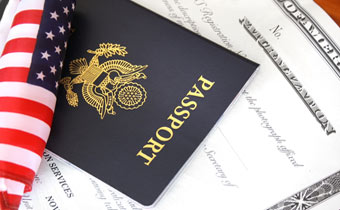By Tim Gruver
Northwest Asian Weekly
 More than 80 people from 43 different countries began their new lives as U.S. citizens in a naturalization ceremony on April 7 at Seattle Central Library.
More than 80 people from 43 different countries began their new lives as U.S. citizens in a naturalization ceremony on April 7 at Seattle Central Library.
Seattle Mayor Ed Murray and staff members from the United States Citizenship and Immigration Service presided over the ceremony. A prerecorded video address by President Barack Obama celebrated America’s history of immigrants to the cheers of the auditorium’s new Americans.
They join over 1.3 million immigrants who have become naturalized since 2014, according to the Migration Policy Institute. Their stories of hardship, diligence, and success are the result of many long journeys.
Hai Banh, an IT consultant for Lockheed Martin, first arrived in the United States at the age of 10 as a refugee in the late 1980s, after traveling with his family from northern Vietnam.
Banh recalled sailing with his parents and three younger siblings for six days at sea, surviving on as little as one cup of water per day, until a U.S. Navy patrol assisted them in reaching Malaysia and eventually the United States a year later.
The family stayed with Banh’s uncle, a pilot, in Lancaster, Pa. for a number of years, relying on several Vietnamese friends’ help while learning English. Banh’s first job was as a paper carrier and his parents supported the family working in manufacturing.
Banh graduated with a degree in electrical engineering from California State University, Los Angeles before gaining his citizenship. He sees the United States not only as a place of opportunity, but as a democracy unlike the country he left behind.
“The U.S. is not as corrupt as the places I saw,” Banh said. “Its government has checks and balances. The freedom of news keeps the government honest.”
He found that life on the American West Coast moved at a faster pace than that of his homeland and he missed the more amicable nature of those back in Asia. Still, he has no regrets about the years he spent to achieve American citizenship.
If there’s anything Edgar Erestain, a Filipino, could do without, it’s traffic. Seattle’s traffic jams have only gotten worse in the 16 years that Erestain has lived in Washington state.
“Before, I could go from Seattle to Bellevue in, say, 15 to 20 minutes.” Erestain said. “Now, it takes me about an hour to an hour and a half.”
He said he is still thankful for the many opportunities that living in America has provided for him and his family. His daughter is studying nursing at South Seattle Central College.
Benjawan Suwannakatesakul, or Pia to her friends, misses the friendly faces she remembers from her native Thailand.
“Everywhere you go, people smile and they seem happy because they appreciate what they have around them. They’re happy about what they have and what they are,” Suwannakatesakul said.
Working as a language tutor to low-income children in her native country, she never thought about moving to America until she attended St. John’s University in New York City and later the University of Washington’s graduate school to study accounting.
Living in the United States for seven years on a student visa with a supportive host family, Suwannakatesakul described herself as homesick at first, experiencing challenges such as understanding fast food menus and conversing with new people.
“In the first year, it was really difficult,” Suwannakatesakul said. “When I came here, everything, the culture, the language, the people, the weather, the food, was all different.”
Suwannakatesakul saw making friends as a means of breaking down language barriers.
“I try not to have friends who speak the same language as me,” Suwannakatesakul said. “Otherwise, I wouldn’t practice my English.”
Suwannakatesakul works as an accountant for Miller Laine Properties in Bellevue and is a part-time language instructor. Her passions include dancing, traveling, and Hello Kitty.
“I love my job,” Suwannakatesakul said. “I want to make sure that every day I wake up, I’m happy.”
Suwannakatesakul thinks of herself as lucky to have had the friends and support she received coming to America. Learning the language can be difficult, but immigrants should never give up, she said.
Tim Gruver can be reached at info@nwasianweekly.com.



